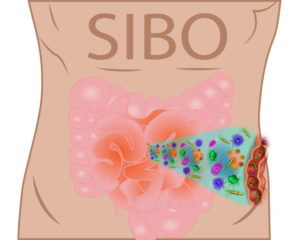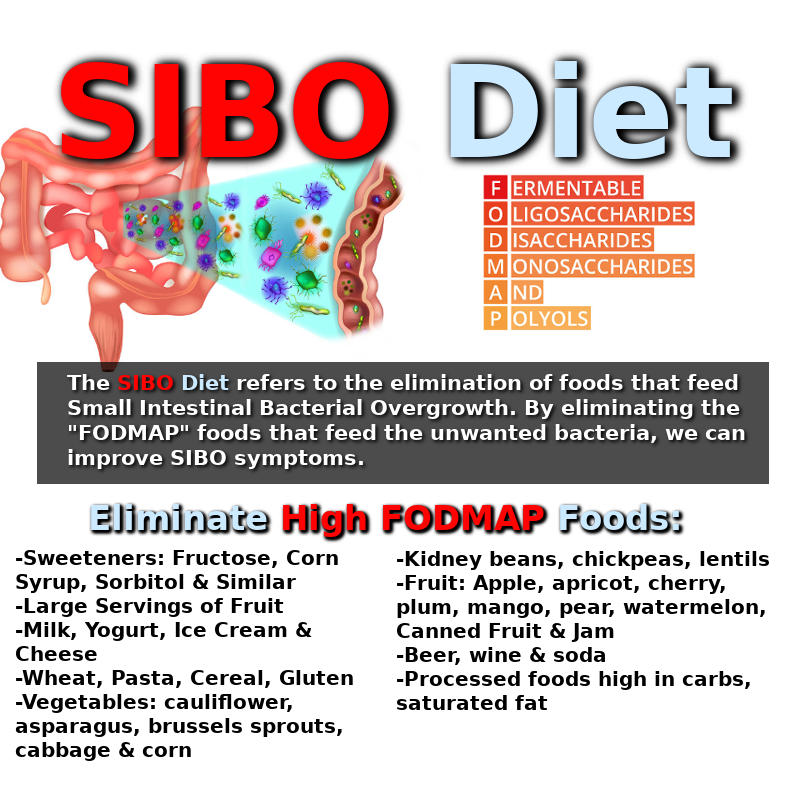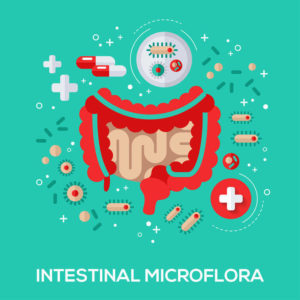SIBO Herbal Treatment

-
Contents:
- Natural SIBO Treatment
- Herbal Remedies
- Resetting the Migrating Motor Complex
- Supporting the Vagus Nerve
- The Normal Standard of Care
- Conclusions
SIBO is an acronym that stands for Small Intestinal Bacterial Overgrowth. While gastroenterologists and family medical doctors alike once considered SIBO to be rare, new research shows that the condition is far more common than previously assumed (Source: PubMed). The normal standard of care for SIBO treatment centers around antibiotics such as Rifaximin or Erythromycin. While these antibiotics can kill off the offending bacterial infection, they don’t resolve the underlying health conditions that led to the occurrence of unwanted bacterial growth in the first place. Another drawback to antibiotics is that they can kill off beneficial gut bacteria along with the bad. Without this healthy gut flora in place, the patient may be vulnerable to reinfection and may have other digestive issues. While there may be times when SIBO treatment necessitates antibiotics, it’s a good idea to also incorporate natural treatments to rebuild gut flora and modify food/lifestyle to support proper recovery.

SIBO Herbal Treatment combined with a holistic approach to rebuilding a healthy gut flora has been gaining in popularity in recent years. Despite the progress being made in natural and herbal treatments combined with the low FODMAP “SIBO Diet“, there may still be times when an antibiotic is deemed necessary by your gut health doctors and specialists. While we prefer natural and herbal treatment when possible, there are times when things get bad enough that we may prescribe antibiotics to a patient. Interestingly, the antibiotic Erythromycin has been shown to have an effect on how food moves through the digestive tract that may offer some benefits for certain patients suffering from gastrointestinal issues (Source: National Institute of Health).
 Despite this, natural treatment, herbal remedies and a holistic approach are still viable ways to treat SIBO and to help prevent future reinfection, which is a common outcome. Medical researchers have found that SIBO reoccurs within 9 months for 40-45% of those treated with antibiotics. In the course of our clinical practice at Terrain Wellness in Portland, Oregon, we have found that reinfection after antibiotic use is less likely when a holistic, herbal and natural approach to rebuilding healthy gut flora is used. Logically it makes sense that unless we dismantle the conditions that were present when the infection occurred, it stands to reason that reinfection would be a common outcome.
Despite this, natural treatment, herbal remedies and a holistic approach are still viable ways to treat SIBO and to help prevent future reinfection, which is a common outcome. Medical researchers have found that SIBO reoccurs within 9 months for 40-45% of those treated with antibiotics. In the course of our clinical practice at Terrain Wellness in Portland, Oregon, we have found that reinfection after antibiotic use is less likely when a holistic, herbal and natural approach to rebuilding healthy gut flora is used. Logically it makes sense that unless we dismantle the conditions that were present when the infection occurred, it stands to reason that reinfection would be a common outcome.
Natural SIBO Treatment
For all the reasons above and more, herbs and other types of natural SIBO treatment have garnered quite a bit of attention in recent years. In our clinic, we’ve had very positive results using natural treatment. Additionally, there are times when an integrative approach that uses antibiotics in conjunction with natural remedies is the best option for a patient’s unique health needs. The integrative approach that combines natural and antibiotic SIBO Treatment is particularly relevant when time is of the essence and fast recovery is the highest priority. That said, herbs, supplements and lifestyle modification are backed by compelling research. More than just a fad, the medical research is corroborating our clinical experience in treating the gut microbiome with herbs and natural remedies:
Herbal therapies are at least as effective as rifaximin for resolution of SIBO by LBT. Herbals also appear to be as effective as triple antibiotic therapy for SIBO rescue therapy for rifaximin non-responders. (Quoted from: PubMed)

At our clinic, we use a holistic approach that combines SIBO herbal treatments with lifestyle changes including food, daily activity, stress management and functional medicine treatments for endocrine balance for thyroid hormones, estrogen etc. When necessary, we will prescribe medications, but we do so sparingly. By treating the body holistically, we unravel the underlying conditions that increased the chances of getting SIBO in the first place. At times, SIBO can contribute to Hashimoto’s flare up and other autoimmune conditions. Because many of these conditions are related, we often treat patients for a cluster of health concerns rather than looking at each one as unrelated.
It’s beyond the scope of a website article to recommend specific herbs or treatments or dosages to non-patients. A particular herb or supplement may cause an unknown interaction with other health conditions and/or medications. For this reason, don’t start/stop taking a supplement, herb or medication without consulting with your doctors and healthcare team.
SIBO Herbal Treatment
-
Candibactin-BR
- Coptis root and rhizome extract (coptis chinensis, containing berberine) 30 mg
- Indian Barberry root extract (berberis aristata, containing berberine) 70 mg
- Berberine Sulfate 400 mg • Proprietary 4:1 Extract 300 mg: Coptis root and rhizome (coptis chinensis)
- Chinese Skullcap root (scutellaria baicalensis)
- Philodendron bark (phellodendron chinense)
- Ginger rhizome (zingiber officinale)
- Chinese Licorice root (glycyrrhiza uralensis)
- Chinese Rhubarb root and rhizome (rheum officinale)
-
Dysbiocide
- Dill Seed
- Stemona Sessilifolia
- Artemisia Absinthium shoots and leaves extract
- Pulsatilla Chinensis rhizome powder and extract
- Brucea Javanica
- Picrasma Excelsa bark extract
- Acacia Catechu stem extract
- Hedyotis Diffusa powder and extract
- Yarrow leaf and flower extract
-
Candibactin-AR
- Red Thyme oil (thymus vulgaris, providing 30%-50% thymol) 0.2 mL
- Oregano Oil (origanum vulgare, providing 55% to 75% carvacrol) 0.1 mL
- Sage leaf 5.5:1 extract (salvia officinalis) 75 mg
- Lemon Balm leaf 5:1 extract (melissa officinalis) 50 mg
-
FC Cidal
- Tinospora cordifolia (stem)
- Equisetum arvense (stem)
- Pau D’Arco (inner bark)
- Artemisia dracunculus (leaf)
- Sida cordifolia (aerial part)
- Olea europaea (leaf)
DISCLAIMER: we are not endorsing any of the above supplements or their ingredients for the treatment of any disease or health condition. There are a number of factors that influence treatments, prescriptions and care plan that can’t be addressed in an article. Please speak with your doctor before changing your medications or healthcare plan.
Resetting the Migrating Motor Complex
After the offending bacteria associated with SIBO has been eliminated, there are steps that can be taken to make the recovery more complete and permanent. One of the contributing factors to excess bacteria in the small intestine is slowed passage of food through the small intestine. The passage of food through the body is done via peristalsis, which is the smooth muscle contractions that squeeze food along the GI tract. Swallowing food is a common example of peristalsis. The body’s unconscious control of peristalsis in the intestines is known as the Migrating Motor Complex.
A healthy Migrating Motor Complex keeps partially digested food traveling in the right direction. This healthy movement discourages unwanted bacteria from the colon from moving upstream into the small intestine (See: Kresser Institute). One of the things that’s often missing in the normal Standard of Care for SIBO is supporting treatment to help prevent reinfection. Unless we reset the Migrating Motor Complex so that digesting food flows through fast enough, reinfection will be a common occurrence. The process of supporting healthy Migrating Motor Complex involves supporting vagus nerve, which is associated with the “Rest & Digest” process in the body. Chronic stress, inflammation and other health conditions tend to move our bodies from “Rest & Digest” into “Fight or Flight” mode. Because of this, we work with our patients to reduce systemic inflammation and use modalities such as acupuncture, NET (Neuro Emotional Technique) and lifestyle modification for stress reduction and helping to release emotions tied to past trauma.
There are also a number of herbs, supplements and lifestyle modifications known to help support the vagus nerve, which may help promote healthy Migrating Motor Complex. Here are a few ideas:
- Deep, slow breathing:
- Deep breathing, Box Breathing or meditation signal the body that you are in a safe place and that it’s okay to let your guard down for a minute. The practice of deep breathing daily has a number of positive health benefits, one of which is that you’ll reduce Fight or Flight stress and promote the vagus nerve through a Rest & Digest state.
- Cold Plunge:
- Acute exposure to cold causes many physiological changes in the body, one of which is stress reduction by taking the body out of a Fight or Flight response (see: A Cold Splash). Talk with your doctor to find out if cold plunges are safe for you.
- Singing, Chanting:
- Singing changes the way your brain functions and is useful for reducing stress. This stress reduction helps promote healthy Migrating Motor Complex (See: Singing Changes Your Brain).
- Exercise:
- A regular exercise routine improves one’s health in a number of ways, one of which is by reducing stress and improving digestion. See our article on How to lose weight with Hashimoto’s for more details. Also, be sure to discuss exercise with your doctor before beginning/changing a fitness routine.
Supporting the Vagus Nerve
What’s Wrong With Standard SIBO Treatment?

The standard method for treating SIBO is to kill off the bacteria with antibiotics, with repeated rounds of antibiotics given if the infection comes back, as it does often. This reinfection after treatment with antibiotics may be due to the fact that these medications don’t dismantle the risk factors that led to the infection to begin with. Researchers note that almost half of those treated with antibiotics have the infection come back in less than a year. As a clarification, there may be times when an antibiotic becomes necessary and it is important to follow your doctors’ instructions. That said, the medical community needs more open communication about the side effects and limitations of treating SIBO with antibiotics as well as exploring the benefits of lifestyle modification and natural treatment.
Standard of Care is a medical term meaning the established way in which most doctors (including many gastroenterologists) treat excessive bacteria in the small intestine. Basically, the standard of care is what you’re taught in medical school. This approach is often a one-size-fits-all approach that seeks to reduce healthcare to a simplistic series of if-then scenarios. Think: have sickness -> give solution. While this approach can be useful in emergency medicine, it doesn’t address the complexities of the human body. Also, it can easily lead to polypharmacy, where doctors need to prescribe more and more drugs to combat the complications from the last drug given. While the Standard of Care provides stability and ensures a minimum quality, the system discourages innovation and is slow to evolve. As with anything in life, there are pros and cons.
So, what’s wrong with the Standard of Care when it comes to harmful intestinal bacteria? The first problem is that the normal testing procedures can lead to false negatives, leading well-meaning gut-health specialists to believe that SIBO isn’t a factor. The next problem is that since SIBO was long-considered to be a rare condition (we now know better), an internal medicine doctor can be dissuaded from investigating gut microbiome health further because of this historic bias. All these notwithstanding, the biggest problem is that doctors frequently prescribe antibiotics to kill off the excess bacteria without taking action to rebuild healthy gut flora or microbiome after treatment. Also, doctors can also give further consideration to natural, SIBO Herbal Treatment as well as dietary and lifestyle changes to help prevent reinfection.

Taking antibiotics to treat intestinal bacteria without resolving underlying factors is problematic because 43% of patients had their SIBO return within 9 months or less in a recent medical study. This means that almost half of patients would need to undergo multiple rounds of antibiotics in the course of treatment. This is problematic because the antibiotics used to combat SIBO may also kill off the healthy bacteria that we need for proper digestion. Furthermore, some healthcare professionals cite multiple rounds of antibiotics as a SIBO risk factor. This may be because these medications kill off good and bad bacteria alike; which may leave the gut more susceptible to infection by bad bacteria because there are no healthy bacteria in place.
I’ll use an analogy to explain. Suppose you have weeds in your lawn and kill them using a general herbicide that kills everything. Weeds gone, end of story, right? Well, not so much. The herbicide also killed the grass, so now there’s a desolate wasteland devoid of weeds and healthy grass alike. Then what happens? With no healthy grass in place, weeds don’t have to compete with healthy grass and take over the entire yard. And guess what, weeds tend to grow faster and repopulate bare dirt faster than the healthy lawn that we want. So, now instead of having healthy grass with some weeds in it, you have a desolate wasteland with nothing but weeds.
In the above example: the dirt is your gut, the lawn is healthy gut bacteria, weeds are bad bacteria and antibiotics are herbicide. Antibiotics will solve the problem of bad gut bacteria but will not ensure that beneficial gut flora come back.
Also worth noting is the fact that new medical research shows that herbal treatment was effective for treating small intestinal bacterial overgrowth. This shows that the medical Standard of Care is evolving, albeit slowly (PubMed: Herbal Therapy Is Equivalent to Rifaximin for the Treatment of Small Intestinal Bacterial Overgrowth). In our clinical experience, we’ve found that natural treatment and/or herbal remedies do work, but there may still be times when an antibiotic is called for. When we do prescribe antibiotics, its important to continue treatment with us afterwards so that we can work to rebuild gut health over time.
Conclusions:
Natural SIBO treatment including herbal supplements, lifestyle changes and dietary modification have come a long way in helping to alleviate this uncomfortable and painful health condition. There are pros and cons to antibiotics vs natural treatment, so consider speaking with a doctor experienced in gut health, functional and natural medicine to get the whole picture. Antibiotics without supporting treatment frequently results in a reinfection. As such, consider moving from considering natural treatment versus antibiotics as an either/or scenario and use herbal supplements, lifestyle and supportive care to help make your SIBO recovery more permanent.
Yours in Health,
Dr. Danielle Lockwood ND LAc

